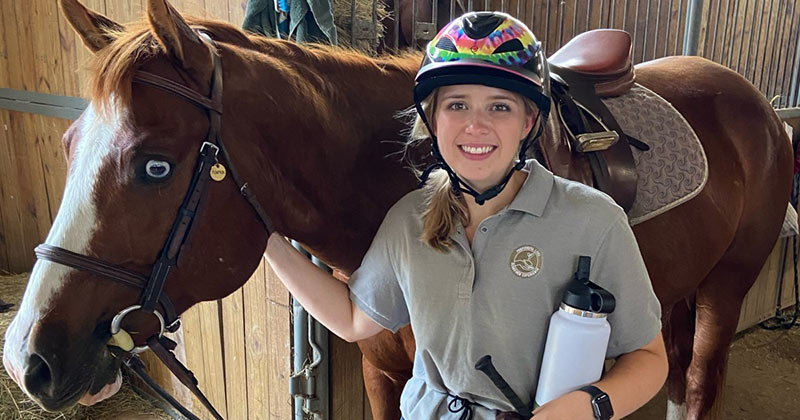Horseback riding provides self care during internship marked by Covid-19

Stephani Shumaker embraced her rural internship so completely she took up horseback riding. And despite Covid-19, she was able to continue to ride, even entering a horse show her last week of internship.
Though she’s lived in Chicago for seminary, Shumaker considers Omaha her first “real Midwest” experience. She’s not Augustana Lutheran Church’s first LSTC intern, though, and the congregation has a rich history of inclusivity, leading the way on LGBTQ+ issues and encouraging other congregations to adopt a Reconciling in Christ status.
Shumaker says she is “consistently surprised” with the welcome she’s received from churches she has served in field education.
“I’m younger and move away from my family year after year and semester after semester. It’s scary to move but I’m consistently welcomed with open arms into their culture, their lives,” she said, singing the praises of Augustana. “I learned a lot because of Covid. They warn us in field education that there could be resistance to new things, but I’ve met little resistance. People are willing to try new programs, listen to new sermon ideas, new methods of preaching. They’re open to trying new things and step up and take on my ideas as their own.”
She also affirms LSTC’s ability to connect with internship congregations that are “vastly different” than Ministry in Context (MIC) congregations that seminarians serve while in their second year. Mostly in the Chicago area, these parishes are often similar in community, culture, size and budget.
Covid-19 made this year’s internships unlike any others. Her internship project to teach confirmation students about food insecurity needed to be scrapped for new one—creating midweek online worship during Lent.
“I couldn’t meet with the students and we couldn’t take in food. So I led a Wednesday night service that was contemporary and used Taizé. I had to change everything on a moment’s notice, just after I’d hyped up my original project to the congregation.” She also did a six-week Zoom Bible study about loving neighbor as self.
And Holy Week on Zoom? “I never dreamed of having to navigate Holy Week online,” she exclaimed, adding that she suspects this year’s interns (largely young adults) brought some much-needed technology skills to their congregations for unexpected Facebook and Zoom use.
“I felt useful,” she said.
Her experience in Omaha was made richer by an ability to fulfill her Air Force chaplaincy internship at the nearby base on her day off from Augustana—preaching and leading in the chapel and providing counseling.
Late this summer when meeting ecumenical colleagues from different denominations at Air Force training, she was proud of how prepared she is for ministry.
“My time on internship was pivotal. I was able to preach and sit in on budget meetings, provide pastoral presence far more than everyone else. None of them had the CPE or Ministry in Context or internship experience I had.”
When the colleague group did role playing and case studies—problems a chaplain might encounter—she was able to “answer without even thinking.” Her advisor was astonished she could prepare the liturgy and preach in such a seasoned manner, telling her if she’d stayed another week he could have taken some days off and trusted her with the worship service.
But back to that horse experience. Shumaker also uses it as a metaphor for a thorough ELCA seminary education. She says seminarians are like thoroughbreds—known for their agility, speed and spirit on a racetrack.
“What a gift it is to be a thoroughbred, leading the pack, and challenged to have and give what is required,” she said.
Being around horses throughout the year taught her the importance of self-care that will serve her well in ministry. No one at the barn knew what she did; she was able to take her pastor hat off.
“And during Covid, it’s easy to be six feet away when on top of a horse.”